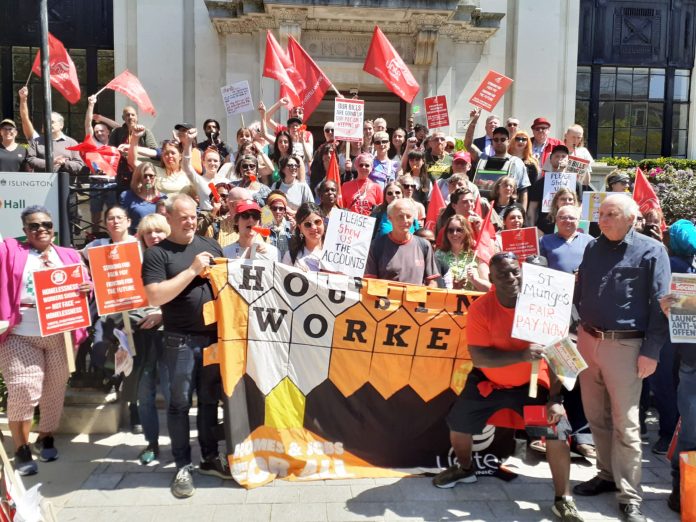Victory to the Mungo’s strikers!
Socialist Party members in London and in Unite Housing Workers’ branch
Homelessness workers at St Mungo’s, members of the Unite housing workers branch, are on strike in response to a pitiful ‘offer’ of 1.75%.
Following an unproductive meeting with the Mungo’s CEO on 12 June, a members’ meeting attended by a record 276 people voted overwhelmingly to move to indefinite strike action. All members present bar one voted to escalate action, and 70% voted for indefinite action! There is a clear mood and a bitter determination amongst members to see this through to the end.
This places a special responsibility on Unite and other trade unions to enthusiastically back this dispute. It is vital that we link this dispute up with other workers’ struggles. A victory would have an extremely positive effect on the whole movement.
Over ten years, frontline workers’ pay has fallen by 25%. Meanwhile, senior management’s share of the pie has grown. Mungo’s executives’ salaries have risen by 77%. The CEO said that she thought Unite’s planned strike action was “disproportionate”!
Mungo’s should pay the 10% increase that workers demand. We say open the accounts to trade union inspection – no trust in the board’s management of our resources.
In fighting for a decent pay rate, Unite members are also fighting to defend homelessness services. Even government figures say homelessness is on the increase, up by 26% over the last year but funding is down. Fight for the public funding the service needs!
Picket lines
Strikers are learning the importance of picket lines to build the strength of the strike among members and win more to the union. Throughout the dispute the number of picket lines has gone up, and the success of those pickets has further boosted confidence of victory.
The escalation of the dispute requires an even more intense effort on the picket line to prevent agency and locum workers from crossing the picket lines.
It also requires a further effort to turn around some workers who may have been sitting on the fence up to now.
One rep described the growth in support at a project he visited: “In the first week, no one was out. By the end of that week, one person was out. Now everyone is out.”
An agency worker discussed with the Unite branch organiser, and as a result told the agency not to send him back to St Mungo’s. Picket lines are vital to build the strike and give strikers a forum to discuss tactics. There must be maximum participation of members in discussing tactics and next steps.
Mungo’s projects are located in areas where commissioning authorities are run by the Greens or Labour. These authorities have power. Labour and Green politicians often say that workers should not have to bear the brunt of the cost-of-living crisis.
Here is a chance for them to be good to their word, and demand that the workers in services which they commission should receive inflation-based pay increases. We say kick out the chief executive and board – run homelessness services as public services under democratic workers’ control. But Labour and Green councils fail to fight the Tory government for the funding necessary.
Under Starmer, Labour offers no alternative. Corbyn’s supporters and policies are being ruthlessly purged. Starmer doesn’t support the strikes, and scrapping Corbyn’s manifesto pledges on council housing is disastrous for homelessness. Strikers don’t have a political voice.
That’s why Socialist Party members are pushing for debates on workers’ political representation at this year’s trade union conferences. Socialist Party members in Unite are fighting for a rule change to allow the union’s funds to be used to back candidates beyond Labour, who back the union’s policies. The Socialist Party campaigns for a new mass workers’ party and puts demands on the trade unions to take steps towards its creation.
- Send messages of support and requests for speakers to [email protected]
- Send union branch donations to the strike fund to Unite Housing Workers LE/1111 Branch, account number 20040626, sort code 60 83 01, reference ‘St Mungo’s hardship fund’







